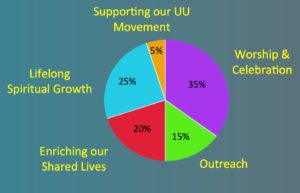Welcome to another in our series of Stewardship as Community Care posts, this one on budgeting.
The Issue
A large majority of our congregations are facing the start of a new church year on July 1, 2020, and budgeting for the new year is very much on everyone’s mind. There is no telling how the pandemic will affect pledge drives underway, nor fulfillment of current year pledges. Congregations also fear the loss or reduction of other income from rentals, fundraisers, plate collections, and other contributions.
What to Do?
First, some perspective. Remember that budgeting is a projection based on the best available information. While this is an extreme situation, there is always uncertainty when we approve a budget for the coming year. We make all sorts of assumptions about pledge payments, membership and attendance, pledges and contributions from new members, fundraising income; and a similar set of assumptions about expenses. So, now as always, we are called on to create a budget based on assumptions and estimates. 
Second, reflect on the transformation that has occurred in our congregations over the past few weeks. The transition to virtual operations has been amazing! This was accomplished by congregation staff and lay leaders, with much support from the UUA. Remind your members about the resources required to sustain our congregations and the UU faith we love so deeply. We want to create budgets that sustain and build on where we are.
Some Ideas
The following are ideas to consider. Be sure to consult your bylaws as you move forward.
- Conduct the best and most inspiring virtual pledge drive you can, inviting people to engage in personal stewardship conversations and and to reflect on how important the congregation and the UUA are right now and always. Rally the congregation toward 100% participation, no matter how modest some individual pledges may be. See some ideas from other congregations here.
- Create a small broad-based task force to track this year’s finances and prepare the budget for next year, instead of the smaller team that works on yearly budgeting and finance. The budget decisions you make will affect your church community in profound ways, affecting staffing, ministries, mission, pastoral care, employer values, our covenant with the UUA – basically everything we do.
- Involve the entire congregation, especially before making any drastic cuts. If the pledge drive falls short and projected revenue looks low for the coming year, invite the congregation to consider a range of options including increasing their initial pledges. If there ever was a time for a second ask, this is it.
- Explore the use of endowments, reserves, other special funds. Might you borrow from your endowment or take a larger than usual draw from principal, or re-purpose a reserve fund? Our long-term funds are often called “rainy-day” funds – this is surely a scenario that qualifies. Again, be sure to consult your bylaws.
- Brainstorm the potential for new and expanded revenue sources. How might you extend the reach of your online worship services and other offerings like lectures, support groups, concerts? People are starved for human contact and connection – what is your church well positioned to offer that might draw people in? Evidence for this is that large numbers of people are attending our virtual services each week. And be sure to ask for contributions and make it very easy to give on the spot.
- Manage pledge fulfillment rigorously and primarily as a pastoral issue. Assign this task to people who are good at reaching out with comfort and compassion. Assume that people who fall behind in their payments are struggling and need our care; call them right away. And encourage people to fulfill their pledge all at once, now, if they can. Some congregants will be able to do this, and will if asked. We have heard that some members are telling their stewards that they now have more discretionary funds since they are spending much less.
- If faced with staff cuts, consider creative alternatives to letting people go. Perhaps the staff would all be willing to take a month’s leave without pay instead of eliminating a position.
- Consider shorter term budgeting, rather than trying to budget for an entire year. Some congregations are postponing their annual meetings and budget process, continuing current budgets and asking people to continue current pledges until things stabilize.
- Explore options for addressing short-term cash flow concerns: invite people to accelerate their pledge payments; consider issuing member notes to borrow money from members who are able and willing to lend. Continue to talk with one another about possibilities as conditions unfold.
What other ideas are out there? Please share with us, and join us tomorrow, Friday, March 27, for a Symposium on this topic.

Stewardship Consultant Barry Finkelstein has been a Unitarian Universalist congregational stewardship consultant since the Fall of 2007 and has worked with over 100 congregations on annual budget drives, capital campaigns, and strategic planning. This is Barry’s last post as he is retiring effective January 1, 2025.

Thank you for calling for inclusion of all in the discussions—in my particular situation, we are struggling towards transparency after decades of opacity, on many issues including finance—knowledge is power, facts matter!
I think I would rather ask folks to go part-time for a while, or cut hours, rather than a month’s layoff or worse, but of course also most important to take the employee’s needs into consideration—I could see different employees preferring each of those options in varied individual situations.
Regarding member notes, I would make that an absolute last resort if not taking it off the table entirely—it could lead to some bad classist issues, resentments, entitlement (both perceived or actual).
Additional thought—I wonder how we go about delaying the annual meeting, no provision for such in our constitution (also no provision for meeting electronically, not in person). Perhaps an electronic meeting could be called and quickly put into recess for a period of time, ideally a certain date. That could be repeated if needed, but I would rather see a known regrouping time than an indefinite postponement—at least there would be a set time for more information-sharing.
Sorry for double-posting, I see no way of editing what I had already submitted.